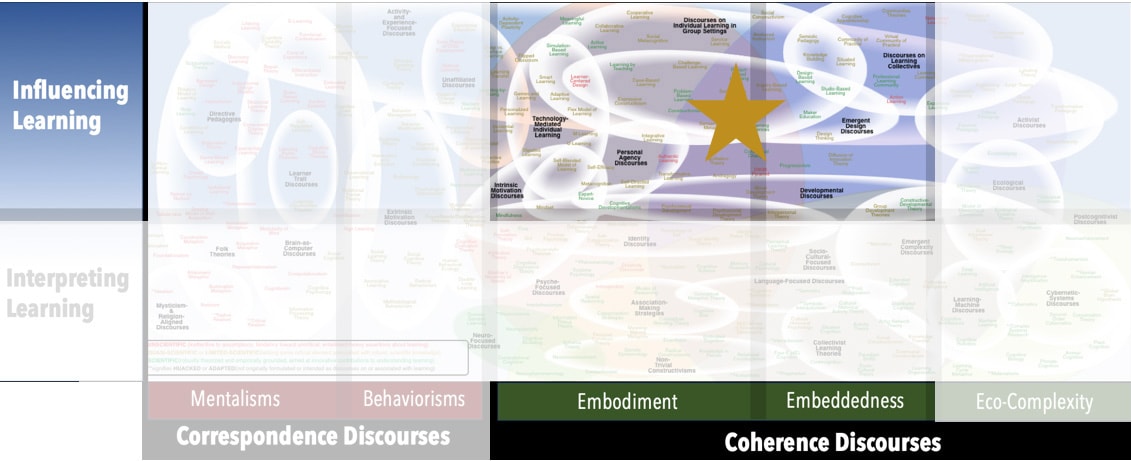Focus
Enhanced individual learning through collaborative workPrincipal Metaphors
- Knowledge is … material
- Knowing is … mastery of material
- Learner is … a sense-making collaborator (with others)
- Learning is … making sense
- Teaching is … setting tasks requiring collaborative effort
Originated
1980sSynopsis
Collaborative Learning is an umbrella term for a range of practical theories concerned with supporting individual learning while working with others on interdependent tasks. It departs from its close relative Cooperative Learning in two key ways: (1) Collaborative Learning is concerned mainly with adult learners (and so expends less effort on supporting soft skills and defining roles), and (2) its principles are applied to any format that permits adequate communication (i.e., face-to-face is not required). Associated discourses include:- Adversarial Collaboration – a process in which supporters of opposing theories co-design a research study that simultaneously tests predictions based on those theories
- Computer-Supported Collaborative Learning (various, 1980s) – Collaborative Learning settings that involve the use of digital technologies to engage in complex problem-solving or design tasks. Models vary. Often technologies are used principally to mediate communications; sometimes technologies are use as problem-solving and/or design tools.
- Online Collaborative Learning Theory (Linda Harasim, 2010s) – a model of instructor-facilitated, online collaboration structured around three phases of knowledge construction: Idea Generating; Idea Organizing; Intellectual Convergence
- Team-Based Learning (Larry Michaelson, 1970s) – a structured approach to Collaborative Learning that attends to group formation (careful and equitable), individual accountability (for preparation and participation), assignment structures (that promote teamwork and learning), and feedback (that should be immediate and frequent)
Commentary
Collaborative Learning is unconcerned with the complexities or dynamics of learning. For that reason, virtually any learning theory can be pasted into advice offered through the framework. It has also been criticized for its inattentiveness to diversity across cultural norms. Perhaps the biggest issue faced by the theory is that it has many varieties, not all of which work from or offer compatible principles.Authors and/or Prominent Influences
DiffuseStatus as a Theory of Learning
Collaborative Learning is not a theory of learning. Indeed, almost any theory of learning can be pasted into most accounts of Collaborative Learning.Status as a Theory of Teaching
Most versions of Collaborative Learning are appropriately interpreted as theories of teaching. They generally offer practical advice on designing tasks and structuring groups – although such advice is often articulated on the assumption of adult learners.Status as a Scientific Theory
There is evidence that structures and tactics associated with Collaborative Learning can support achievement and attitudes. That evidence, however, is not extensive and it the results vary considerably across studies.Subdiscourses:
- Adversarial Collaboration
- Computer-Supported Collaborative Learning
- Online Collaborative Learning Theory
- Team-Based Learning
Map Location

Please cite this article as:
Davis, B., & Francis, K. (2024). “Collaborative Learning” in Discourses on Learning in Education. https://learningdiscourses.com.
⇦ Back to Map
⇦ Back to List
